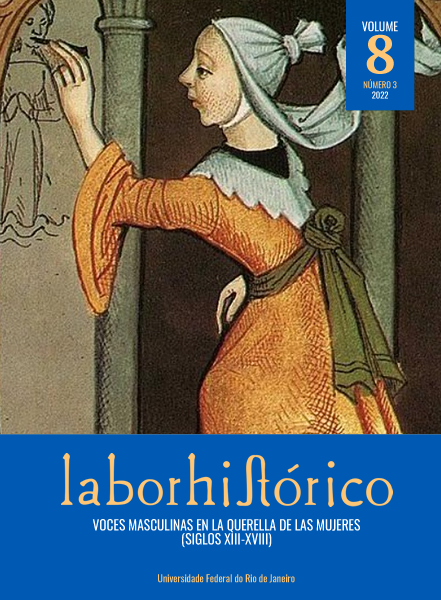The letter of Lauro Quirini to Isotta Nogarola: on the right training of the mind
DOI:
https://doi.org/10.24206/lh.v8i3.56303Palavras-chave:
Isotta Nogarola. Lauro Quirini. Female education. Philosophy. Philogyny.Resumo
In his letter to Isotta Nogarola, Lauro Quirini, a humanist scholar of the 15th century, provides advices related to her readings on dialectic and philosophy. Since Isotta has willingly devoted herself to the study of these “higher disciplines”, he composes a detailed curriculum for her, which consists of texts of advanced philosophical language and content, written either in Latin or ancient Greek. He aspires to serve as her teacher in these matters and to guide her through the intellectual path that she chose to follow, “overcoming her own nature”.
Referências
ABEL, Eugenius (Ed.). Isotæ Nogarolæ Veronensis Opera Quæ Supersunt Omnia. Accedunt Angelæ et Zeneveræ Nogarolæ. Volume 2. Budapest: Apud Gerold et Socios, 1886.
CONTARINI, Giovanni B. Anecdota Veneta. Volume 1. Venice: Petrus Valvasensis, 1757, p. 33-44.
GIBSON, Joan. Educating for Silence : Renaissance Women and the Language Arts. Hypatia, vol. 4(1), p. 9-27, 1989.
JARDINE, Lisa. ‘O Decus Italiæ Virgo’, or the myth of the learned lady in the renaissance. The Historical Journal, vol. 28(4), p. 799-819, 1985.
KING, Margaret L. Book-lined cells: women and Humanism in the early Italian Renaissance. In: RABIL, Albert Jr. Renaissance Humanism. Volume 1: Foundations, Forms and Legacy. University of Pennsylvania Press, 1988, p. 66-90.
KING, Margaret L.; RABIL, Albert Jr. Her immaculate hand. Selected works by and about the women humanists of Quattrocento Italy. Binghamton-New York: Medieval and Renaissance texts and studies, 1992.
KING, Margaret L.; ROBIN, Diana (Ed., Trans.). Isotta Nogarola: Complete Writings. Letterbook, Dialogue on Adam and Eve, Orations. Chicago-London: The University of Chicago Press, 2004.
PIZAN, Christine de. Livre de la mutation de fortune. Manuscripts compilation. Bibliothèque nationale de France, 1884.
PIZAN, Christine de. L’epistre au Dieu d’Amours. In: ROY, Maurice (Ed.). Œuvres Poétiques de Christine de Pizan. Volume 2. Paris: Didot, 1886, p. 1-27.
Downloads
Publicado
Edição
Seção
Licença
Os autores que publicam nesta revista concordam com o seguinte:
a. Os autores detêm os direitos autorais dos artigos publicados; os autores são os únicos responsáveis pelo conteúdo dos trabalhos publicados; o trabalho publicado está licenciado sob uma Licença Creative Commons Atribuição-NãoComercial 4.0 Internacional, que permite o compartilhamento da publicação desde que haja o reconhecimento de autoria e da publicação pela Revista LaborHistórico.
b. Em caso de uma segunda publicação, é obrigatório reconhecer a primeira publicação da Revista LaborHistórico.
c. Os autores podem publicar e distribuir seus trabalhos (por exemplo, em repositórios institucionais, sites e perfis pessoais) a qualquer momento, após o processo editorial da Revista LaborHistórico.


